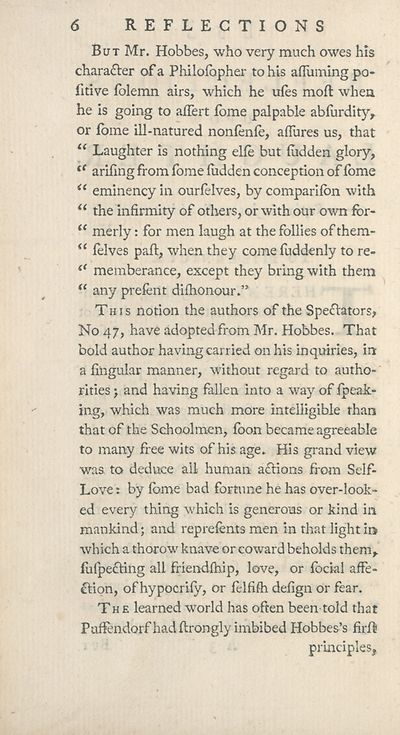Download files
Complete book:
Individual page:
Thumbnail gallery: Grid view | List view

6
REFLECTIONS
But Mr. Hobbes, who very much owes his
character of a Philofbpher to his afliiming po-
fitive lolemn airs, which he ufes moft when
he is going to aflert fbme palpable abfurdity,
or fbme ill-natured nonfenfe, allures us, that
“ Laughter is nothing elfe but (udden glory,
(t arifing from fbme fudden conception of fbme
“ eminency in ourfelves, by comparifbn with
“ the infirmity of others, or with our own fbr-
“ merly: for men laugh at the follies of them-
“ felves paft, when they come fuddenly to re-
“ memberance, except they bring with them
“ any prefent difhonour.”
This notion the authors of the Spectators,
No 47, have adopted from Mr. Hobbes. That
bold author having carried on his inquiries, in
a lingular manner, without regard to autho¬
rities j and having fallen into a way of {peak¬
ing, which was much more intelligible than
that of the Schoolmen, fbon became agreeable
to many free wits of his age. His grand view
was to deduce all human actions from Self-
Love : by fbme bad fortune he has over-look¬
ed every thing which is generous or kind in
mankind; and reprefents men in that light in
which a thorow knave or coward beholds them,
fu(petting all friendlhip, love, or fbcial affe¬
ction, of hypocrify, or felfifh defign or fear.
The learned world has often been-told that
P uffendorf had ftrongly imbibed Hobbes’s firft
principles.
REFLECTIONS
But Mr. Hobbes, who very much owes his
character of a Philofbpher to his afliiming po-
fitive lolemn airs, which he ufes moft when
he is going to aflert fbme palpable abfurdity,
or fbme ill-natured nonfenfe, allures us, that
“ Laughter is nothing elfe but (udden glory,
(t arifing from fbme fudden conception of fbme
“ eminency in ourfelves, by comparifbn with
“ the infirmity of others, or with our own fbr-
“ merly: for men laugh at the follies of them-
“ felves paft, when they come fuddenly to re-
“ memberance, except they bring with them
“ any prefent difhonour.”
This notion the authors of the Spectators,
No 47, have adopted from Mr. Hobbes. That
bold author having carried on his inquiries, in
a lingular manner, without regard to autho¬
rities j and having fallen into a way of {peak¬
ing, which was much more intelligible than
that of the Schoolmen, fbon became agreeable
to many free wits of his age. His grand view
was to deduce all human actions from Self-
Love : by fbme bad fortune he has over-look¬
ed every thing which is generous or kind in
mankind; and reprefents men in that light in
which a thorow knave or coward beholds them,
fu(petting all friendlhip, love, or fbcial affe¬
ction, of hypocrify, or felfifh defign or fear.
The learned world has often been-told that
P uffendorf had ftrongly imbibed Hobbes’s firft
principles.
Set display mode to:
![]() Universal Viewer |
Universal Viewer | ![]() Mirador |
Large image | Transcription
Mirador |
Large image | Transcription
| Antiquarian books of Scotland > Curiosities & wonders > Reflections upon laughter > (14) |
|---|
| Permanent URL | https://digital.nls.uk/119117660 |
|---|
| Description | Thousands of printed books from the Antiquarian Books of Scotland collection which dates from 1641 to the 1980s. The collection consists of 14,800 books which were published in Scotland or have a Scottish connection, e.g. through the author, printer or owner. Subjects covered include sport, education, diseases, adventure, occupations, Jacobites, politics and religion. Among the 29 languages represented are English, Gaelic, Italian, French, Russian and Swedish. |
|---|

